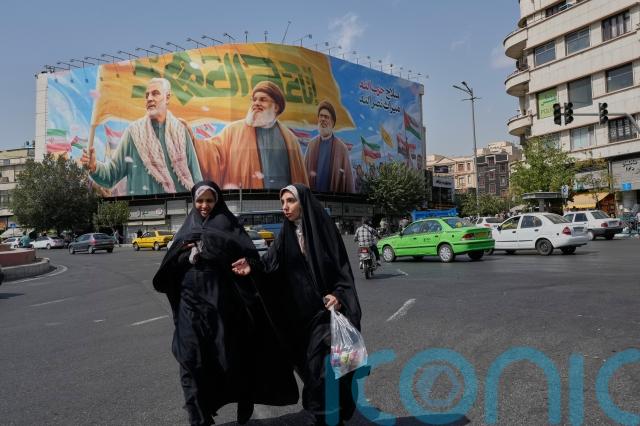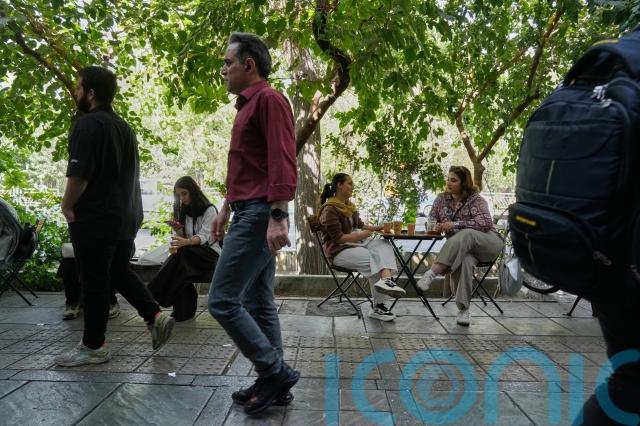
Iran is preparing for a possible confrontation with the West after the United Nations reimposed sanctions over its nuclear programme, even as some pushed for continued negotiations to ease the economic pain squeezing the country.
The sanctions imposed before dawn on Sunday again freeze Iranian assets abroad, halt arms deals with Tehran, and penalise any development of Iran’s ballistic missile programme, among other measures. It came through a mechanism known as “snapback” included in Iran’s 2015 nuclear deal with world powers.
Iran’s Parliament briefly denounced the sanctions on Sunday before going into a closed-door session likely to discuss the country’s response, which could include abandoning the Nuclear Nonproliferation Treaty and rushing for the bomb.
There are concerns about a new round of fighting between Iran and Israel, as well as potentially the United States, as missile sites struck during the 12-day war in June now appear to be being rebuilt.
Meanwhile, Iran’s rial currency fell to a new record low of 1.1 million to 1 US dollar, sending food prices even higher and making daily life that much more challenging.
Mohsen Rahaei, a 49-year-old Tehran resident, said: “The government must negotiate. This is a world of business. One must get along with everyone, with all countries.”

Iran tried a last-ditch diplomatic push at the UN General Assembly in New York this week, but efforts by its officials, as well as China and Russia, failed to stop the sanctions.
Speaking to the Young Journalists Club, which is affiliated with Iranian state television, politician Ismail Kowsari said Parliament would discuss withdrawing from the nuclear treaty. Nonproliferation experts fear such a move could see Iran follow a path first laid down by North Korea, which said it abandoned the treaty before obtaining nuclear weapons.
Mr Kowsari however said it would not mean Iran would go for the bomb, and such a move would need the approval of Iran’s 86-year-old Supreme Leader Ayatollah Ali Khamenei. Iranian diplomats have long pointed to Supreme Leader Khamenei’s preachings as a binding fatwa, or religious edict, that Iran will not build an atomic bomb.
Parliament Speaker Mohammad Bagher Qalibaf issued his own warning to those who would honour the UN sanctions as the chamber began meeting on Sunday.
“We announce that if any country wants to take action against Iran based on these illegal resolutions, it will face serious reciprocal action from Iran, and the three European countries that are the initiators of this illegal action will also face our reaction,” Mr Qalibaf said, according to a report by the state-run IRNA news agency.
Parliament then entered a closed session, without any formal announcement on what, if anything, was decided.
Israel’s foreign ministry has applauded the sanctions being reimposed, saying: “The goal is clear: prevent a nuclear-armed Iran.

“The world must use every tool to achieve this goal.”
France, Germany and the UK triggered snapback over Iran 30 days ago for further restricting monitoring of its nuclear programme and the deadlock over its negotiations with the US.
Iran further withdrew from the International Atomic Energy Agency monitoring after Israel’s war with the country in June, which also saw the US strike nuclear sites in the Islamic Republic.
Meanwhile, the country still maintains a stockpile of uranium enriched up to 60% purity – a short, technical step away from weapons-grade levels of 90% – that is largely enough to make several atomic bombs.
Iran has long insisted its nuclear programme is peaceful, though the West and IAEA say Tehran had an organised weapons programme up until 2003.
The three European nations on Sunday said they “continuously made every effort to avoid triggering snapback”, but Iran “has not authorised IAEA inspectors to regain access to Iran’s nuclear sites, nor has it produced and transmitted to the IAEA a report accounting for its stockpile of high-enriched uranium”.
The nations also noted Iran enriches uranium at a level that no other peaceful programme does.
US Secretary of State Marco Rubio praised the three European nations for “an act of decisive global leadership” for imposing the sanctions on Iran and said “diplomacy is still an option”.
He added: “For that to happen, Iran must accept direct talks.”
Subscribe or register today to discover more from DonegalLive.ie
Buy the e-paper of the Donegal Democrat, Donegal People's Press, Donegal Post and Inish Times here for instant access to Donegal's premier news titles.
Keep up with the latest news from Donegal with our daily newsletter featuring the most important stories of the day delivered to your inbox every evening at 5pm.